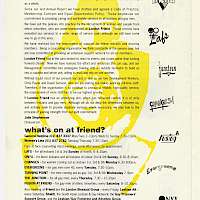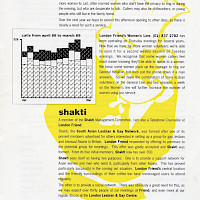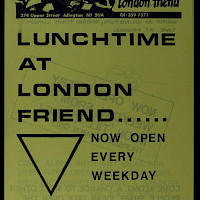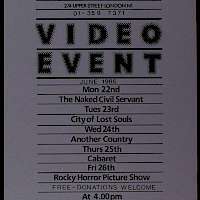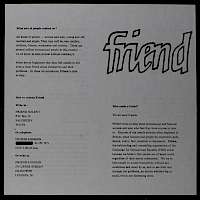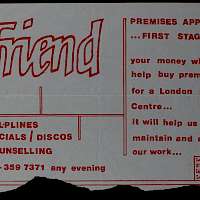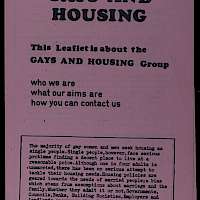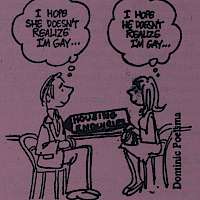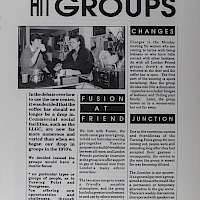A Wealth of Support: London Friend’s Social Groups
By Paul Oliver
From its earliest days Friend recognised the importance of social groups catering for a variety of situations and needs. A Monday evening group for men was launched in 1976—and was so popular that a second group soon started to meet on Tuesday evenings. Attendance at each averaged 25–30 per evening almost from the outset. At around the same time a women’s group started meeting on Thursday evenings. Before long there was a second group for women, too, which met at lunchtimes on Thursdays. Both the men’s and women’s meetings soon became springboards for a range of additional activities: there was, for example, a groundbreaking Lesbian Bereavement Group that developed in 1991 out of the group Lesbians at Friend on Sundays.
At the time these were the only social groups for lesbians and gay men in London. They catered for the shy, for those who felt isolated and wanted to make likeminded friends, and for those who were looking for an alternative to London’s burgeoning gay scene. These have remained central elements in Friend’s ethos to this day. 1
Many new groups have been launched over the years, some of them designed to serve very specific purposes. Turning Point, for men coming out or thinking of doing so, which was set up in July 1984, is a case in point. It was urgently needed: many of those who attended had had little or no contact with other gay men. Although it met formally at Friend in alternate weeks, members also gathered in a local pub on the other Wednesdays. 2 The annual report for 1987/88 notes that it was not unusual for men to continue attending Turning Point long after they had come to terms with their sexual orientation. In order to preserve its character as a group for those who had yet to come to terms with it, they were tactfully redirected to The Junction, one of the men’s groups dating from the 1970s. 3 And Turning Point is still meeting.
1987 saw the launch of Evergreens, a group aimed at men over 40, as well as a group for people with long-term mental health issues. Fusion at Friend, ‘for gay men of ethnic minorities’, began meeting on Saturday evenings in 1988. 4 It’s unclear how long it lasted but it must have been defunct by 2008, the year in which the almost identically-named Fusion at London Friend, a ‘fun and interactive’ social group for black and ethnic minority lesbian and bisexual women, started meeting on the last Sunday of each month. 5
The second half of the ’80s also saw a dramatic increase in the involvement of women with Friend. Thus, in 1988 a group called Changes, for women coming to terms with being lesbian, started to meet on the first, third and fifth Monday evenings. 6 Changes is still running today—on the second and fourth Mondays of each month. Towards the end of 1988 a new support group was launched in the form of Lesbians at Friend on Sundays (LAFS), with meetings on the first and third Sunday evenings of each month. 7 (LAFS in effect replaced the Thursday groups, and The Junction took over the Thursday evening slot.) 8 In 1989 Onyx, the lesbian counterpart of Fusion at Friend, held meetings on the Sundays when LAFS didn’t meet. 9 It’s no exaggeration to describe what happened in the second half of the ’80s as a thorough revamping of Friend’s provision as far as social groups were concerned. 10
Some groups have flourished for many years and then fizzled out for completely understandable reasons. Younger Friend, for those aged 18-30 (in practice mainly men), began in the ’70s but eventually became obsolete in the ’90s as a result of young men gradually finding it easier to come out. 11 Other groups have had a much briefer existence. Onyx only stayed at Friend for one year. Cairdre, for Irish lesbians, started in 1991 and lasted until 1995. 12 From time to time groups have been set up which, though destined to be very short-lived, have provided an important service while they lasted. In the first half of 1979, for example, a men’s self-help group met on a fortnightly basis in order to share and discuss what were in many instances chronic problems: the emphasis was on being proactive, with role-play techniques sometimes being used as a means of articulating complex feelings. 13 There is also a history of groups reinventing themselves. The Junction closed down—only to be later reborn as Mattrix. 14 It, too, continues to meet.
Some notable changes in group provision reflect changing attitudes and preferences on the part of the LGBTQ+ community and, of course, developments in society in general. The all-male Evergreens has been replaced by Opening Doors, a group welcoming all older (50+) people, however they define themselves. (It is run in conjunction with Opening Doors London.) The Friday Drop-In is open to all LGBTQ+ people. Separate groups for people of colour no longer exist. Turning Point and Changes now cater for men and women, respectively, of all ages.
As new needs have been discerned, groups have been established to provide for them. There has been a group for those who identify as trans or non-binary, T on Tuesday, since 2013. Atypiqueers, for people on the autism/neurodiversity spectrum, was originally launched before Coronavirus struck in 2020; it has existed on a firm footing since the start of 2022. The Antidote Social, a social group for users of Antidote (the alcohol and drugs service originally set up by current London Friend Chief executive Monty Moncrieff before he worked for Friend but now managed at Friend) has been meeting once a month since 2021. There is a creative writing group and classes for those wishing to improve the level of their spoken English.
The story of London’s Friend’s social groups throughout its first half-century is a narrative of generosity and vision. In the light of its capacity for adaptability, one thing seems certain: however much society changes, in the years ahead Friend can be counted on to continue offering members of the LGBTQ+ community safe spaces away from the scene where they can be themselves, along with others like them.
Footnotes
- Ibid., London Friend annual report 1979, pp. 2, 9, 10; https://londonfriend.org.uk/london-friend-groups [accessed 1 July 2022].
- Bishopsgate Institute archive, Achilles Heel/6/1, London Friend annual report 1985, p. 2.
- London Friend archive, ‘Marian’, London Friend annual report 1987/88, p. 5.
- London School of Economics, HCA/Friend/1/1, National Friend annual report 1987, p. 4; London Friend archive, ‘Marian’, London Friend annual report 1987/88, p. 5; Bishopsgate Institute archive, Achilles Heel/6/1, London Friend annual report 1988/9, p. 2; London Friend archive, ‘Marian’, London Friend annual report 1992, p. 2.
- https://drive.google.com/file/d/1BMlpAXdtzK5cu3sYi2GQUNeLOPwuwqc5/view
- After the formal meetings at Friend members would regularly adjourn to the Drill Hall in Bloomsbury (information supplied by Marian Larragy).
- Bishopsgate Institute archive, Achilles Heel/6/1, London Friend annual report 1988/9, pp. 2, 4. For details of some of LAFS’ schedules in the period 1991–94 see the collection of flyers in London Friend archive, ‘Marian’.
- For a description of The Junction’s activities in the late ’80s see ibid., London Friend annual report 1987/88, p. 5.
- Bishopsgate Institute archive, Achilles Heel/6/1, London Friend annual report 1988/9, pp. 2, 4. Although it was as yet some way off, an important offshoot of these groups, the Lesbian Bereavement Group, was founded in 1992 (London Friend archive, ‘Marian’, London Friend annual report 1992, p. 3).
- Cf. London School of Economics, HCA/Friend/1/1, National Friend annual report 1988, p. 4.
- Roland Jeffery and Dugan Cummings, ‘London Friend: A Gay-led Counselling and Befriending Organisation: A Brief History, 1972–2009’ (2009), p. 3; London School of Economics, HCA/Friend/Additional/3/32, London Friend annual report 1983, p. 3; Bishopsgate Institute archive, Achilles Heel/6/1, London Friend annual report 1985, p. 2.
- London Friend archive, ‘Marian’, London Friend annual report 1992, p. 3; there is also a flyer announcing the group’s first meeting on 13 October 1991.
- Bishopsgate Institute archive, Achilles Heel/6/1, London Friend annual report 1979, pp. 9–10.
- Jeffery and Cummings, p. 3.
Gallery
Bibliography
Jeffery, Roland & Cummings, D., ‘London Friend: A Gay-led Counselling and Befriending Organisation: A Brief History, 1972–2009’ (2009)
Web page
https://londonfriend.org.uk/london-friend-groups [accessed 1 July 2022]
Archival sources
Bishopsgate Institute
Achilles Heel/6/1:
London Friend annual report 1979
London Friend annual report 1985
London Friend annual report 1988/9
London Friend
‘Marian’:
London Friend annual report 1987/88
Flyers announcing LAFS’ schedules for 1991–94
Flyer announcing first meeting of Cairdre on 13 October 1991
London Friend annual report 1992
London School of Economics
HCA/Friend/1/1:
National Friend annual report 1987
National Friend annual report 1988
HCA/Friend/Additional/3/32:
London Friend annual report 1983
